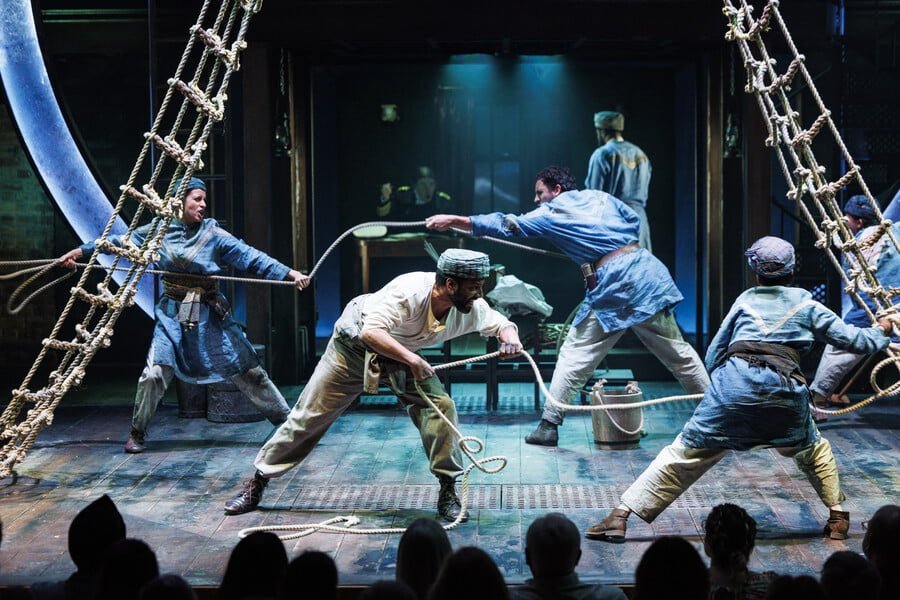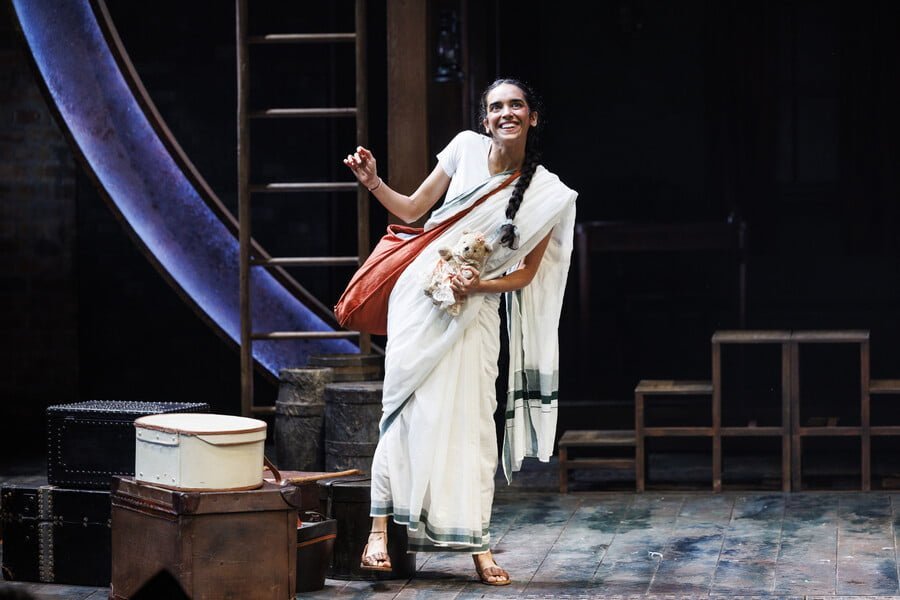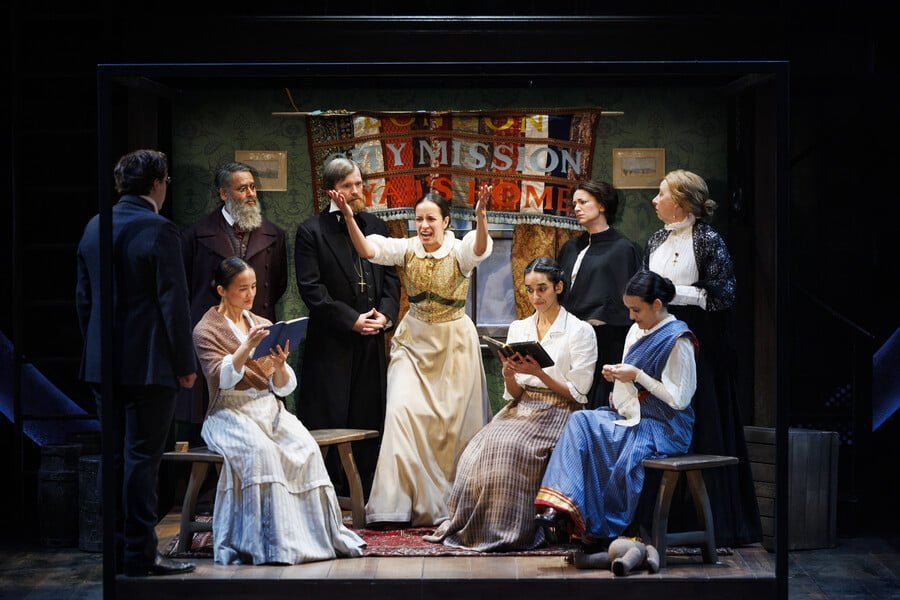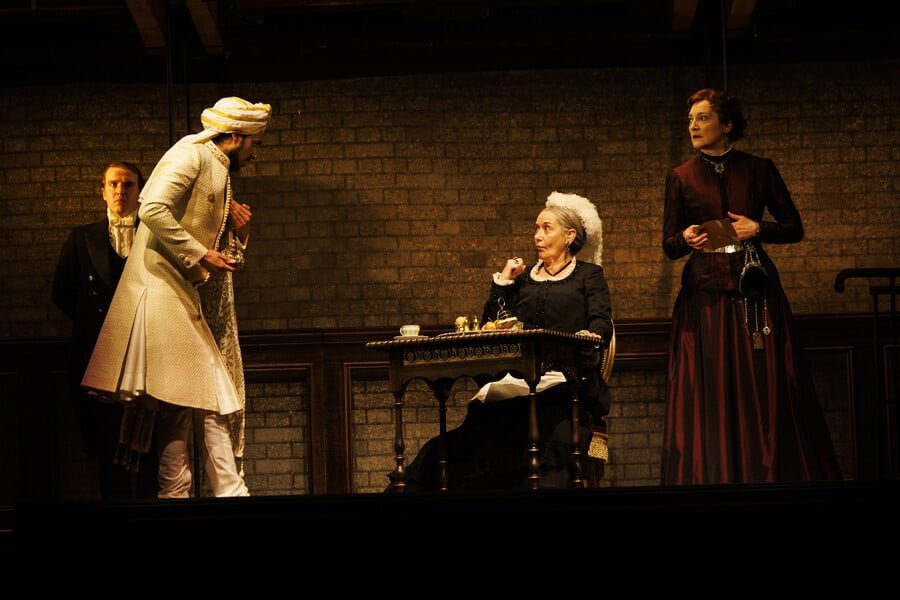150 Years of Indians in Britain
“”They are gossiping about us? At our age? How entertaining.”
Queen Victoria

Tanika Gupta tells four stories in her play “to show that British Asians have been in this country for over 150 years… and had become part of the fabric of this society.”
Rani Das (Tanya Katyal) is an Indian ayah (nurse/nanny) who is cheated and abandoned by her employer before she even gets off the boat in Tilbury. Fortunately she finds work in an aristocratic household. Less fortunately, she is made pregnant by her employer and abandoned once again.
Her shipboard suitor, Hari (Aaron Gill) is an indentured sailor who is whisked back to sea before they can cement their relationship. He is brutalised and persecuted for organising sailors’ rights, but still manages to send Rani letters from afar.
Abdul Karim (Raj Bajaj) is literally a human gift from India to Queen Victoria (Alexandra Gilbreath). However, with his polished manners, practised deference, and poetic tongue, he rises, with the leg up of royal patronage, through layers of British arrogance and entitlement to the very top of her Court. Victoria admires him and he becomes her favourite. He is Munshi, her mentor and link to the Land she rules in name but will never see. His elevation does not make him popular. Rumours spread. But Victoria stands up for her Munshi, at the risk of being what we would now call Sectioned.

Dadabhai Naoroji (Simon Rivers) is a businessman who, radicalised by his experience of England, campaigns and becomes the first Asian Member of Parliament.
The Empress opens with a brilliantly choreographed storm at sea on the New Delhi Run, but on a Passage back to London rather than India. Like Shakespeare’s storms in The Tempest and Twelfth Night, this serves to quieten the audience, secure our attention, and give a sense of foreboding. Especially the latter when, eerily, the ensemble sing George Formby’s Second World War Song “Bless ’em All”. A nicely jarring use of anachronism. The only one I noticed, but perhaps there were others.
But once ashore the pace drops as the narratives drift apart. Rani’s problems recede into the background. We aren’t told how and where she has her baby, only that she feels forced to abandon the child. Hari, meanwhile, is beaten around the world. Dadabhai Naoroji also recedes until Rani is fortunate enough to meet him in a home for abandoned ayahs. How this home came to be founded, run, and supported would be helpful in understanding the contribution of Indians to Britain. Instead we see women support each other and say things like, “Let’s put our heads together and see what we can come up with to help?”

But the dialogue can be stiff and unconvincing: “Men are all the same.” “There is a lack of democracy. The system is in need of reform.” “Why do men wander?” “Death comes to us all.” “No hand can catch time.” “We like curry.” “In time for the Queen’s Jubbly.” “We know they’re no better than us.” “Englishmen are a little old-fashioned.” “So much for BRITISH FAIR PLAY!”
When, after many years apart Rani Das and Hari are re-united we might expect a little more warmth. Perhaps he quietly says,“I always knew I was meant to be there with you.” She replies, “Don’t ever leave me again.” But she knows Hari spent three of those years not far away in London ‘working to improve himself to be worthy of her’, she might be wise to be cautious. At least she appears to believe him.
At one point their Cockney friend Lascar Sally (Nicola Stephenson) says, “I love a bit of Brown.” Sally and other members of the ‘lower orders’ seem to accept and even protect the immigrants. It is the cold-fish British aristocratic who is aroused but callous. And the racist aristocracy scheming and pressurise their own monarch to abandon Abdul Karim. But since he may have “woke” her to the evils of war, racialism, and British Imperialism this may simply be self-protection rather than bigotry. Whatever the truth there is still a huge gap between the fictional Rani Das’s tale and the historic Abdul Karim’s which leaves a huge area of Indian presence and impact in the UK unexamined.
The closing scenes have an elegiac quality since we, mostly, don’t know what will happen to these people. But Queen Victoria does get her Indian apotheosis in a virtuoso finale of dance and music, where Rani Das (Tanya Katyal) and the rest of the hard-working, diamond-precision, cast show just what they can do.

Production Notes
The Empress
Written by Tanika Gupta
Directed by Pooja Ghai
Cast
Starring:
Alexandra Gilbreath
Anyebe Godwin
Avita Jay
Chris Nayak
Miriam Grace Edwards
Nicola Stephenson
Oliver Hembrough
Raj Bajaj
Sarah Moyle
Simon Rivers
Tom Milligan
Joe Usher
Anish Roy
Aaron Gill
Lauren Patel
Francesca Faridany
Tanya Katyal
Premi Tamang
Creatives
Director: Pooja Ghai
Designer: Rosa Maggiora
Lighting Designer: Matt Haskins
Music and Sound Designers: Ben and Max Ringham
Musical Director: Hinal Pattani
Movement: Wayne Parsons
Fights and Intimacy: Rachel Bown-Williams and
Ruth Cooper-Brown
A Royal Shakespeare Company Production
Information
Running Time: Three hours with an interval
Booking at Lyric Hammersmith to 25th October 2023
Then returning to The Swan 1st to 18th November 2023
Theatre:
Lyric Theatre
King Street
Hammersmith
London W6 0QL
Box Office: 020 8741 6850
Website: lyric.co.uk
Tube: Hammersmith
Reviewed by Brian Clover at the Lyric Hammersmith
on 10th October 2023
